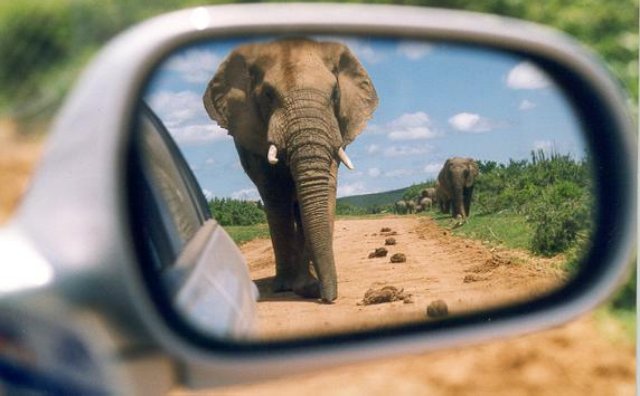#OpenBadges through the rear-view mirror?

Marshall McLuhan:
The past went that-a-way. When faced with a totally new situation, we tend always to attach ourselves to the objects, to the flavor of the most recent past. We look at the present through a rear view mirror. We march backwards into the future.
People need metaphors to understand unfamiliar concepts. We tend to talk about new things using metaphors, similies and analogies. There’s nothing particularly wrong with that – in fact, it can be helpful!
Say your friend buys you an Amazon or iTunes gift card for your birthday. When your friend buys the gift card, they are required to provide your email address, both so that (1) the store knows where to send the gift card and (2) the store can verify you’re you when you come to claim the gift card. After your friend completes the purchase, you receive an email containing a special code. To redeem the gift card, you go to a website, verify your identity, and enter the code. After you enter the code, a certain amount of credit appears in your account, which you can spend however you like.
I think that’s rather a useful simile for Open Badges.
What do you think?
Image CC BY exfordy

It is certainly useful… and ties with some of the technical infrastructure of Open Badges which I feel often gets lost in discussions. To a field based on paper certificates which are perceived as having a high level of authenticity whilst actually being hard to verify and easy to forge this is an important point.
However, I think the real culture shift is to do with badges as rewards and badges as accreditation. Many people I talk to seem to confuse the two. The power of Open Badges is the fact their are accreditation, but the badges word gets conflated with reward. Many teachers love the notion of extrinsic reward, despite the fact it has been shown time and again to have dubious effects on learning.
The challenge of communicating Open Badges at the moment, I think, is articulating this difference, and the benefits that come with it.
I think you’re right, Oliver. And Open Badges evangelists (such as myself) are going to have to try and articulate that difference through metaphors and similes that shed light on the different aspects. 🙂
Am listening to the Scottish Independence debate on the Radio 4 program IPM and the identity issue as a backward look is being discussed. Certification too is a historical description of a person. Indeed the point of attainment (be it on Palace Green outside Durham Cathedral) is an identity defining/sharing moment possibly not as memorable as receiving a high denomination money amount in a birthday card.
Alex Salmond is new Scotland but mainly because all his competitors head down south for greater opportunity. His badge the Saltire is the ultimate qualification and is useful in all sorts of situations but he prefers tartan to define himself as do many children at this time of educational transition. The certificates gather dust but it is the pictures of sons and daughters, sometimes in tartan, graduating from august institutions that adorn middle class living room walls across the world.
Indeed, but you’re assuming (again, using the only metaphors we’ve got) that badges are set to *replace* certificates/degrees. Why not and/and/and instead of either/or?
Yes I have beloved badges/logo carriers/memorabilia big and small purchased in various parts of China and closer adorning various surfaces in my home. These were often sold by clever product placement, eloquent marketing …. I wonder if the beginning of the end for intel was the profligate use of stickers on laptops